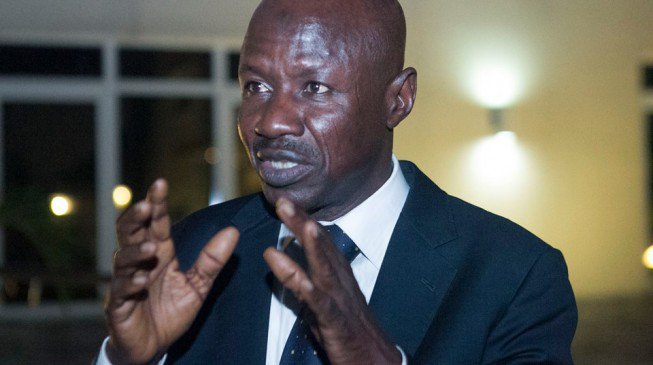
There is the need for a critical appraisal of the candidature of Mr. Ibrahim Magu as a nominee for the position of substantive chairman of the Economic and Financial Crimes Commission (EFCC), following the failure of the Senate to successfully screen him for the plum job.
Ordinarily, it is the usual procedure that before the name of any statutory appointee is sent to the Senate for confirmation; such a person is cleared of security issues.
This is going to be the second time that the lawmakers would reject the nomination of Magu as the chairman of the EFCC, after the Department of State Services (DSS) reaffirmed its position that the nominee lacked the needed integrity to lead the country’s anticorruption agency.
It would be recalled that the DSS had earlier submitted two contradictory reports in which one approved Magu’s confirmation while the other asked that he be rejected. As it is now, there are three options open for the presidency; it is either the nomination is made again, a replacement is sought or Magu is reappointed as the Acting Chairman without having to pass through the Senate.
No doubt, many Nigerians seem to be happy with the anti-corruption stance of the Federal Government and the capability and the political will by President Muhammadu Buhari to successfully fight the battle. Over the years, Nigeria and indeed, many African countries have suffered great setbacks due to the diversion of public funds into private pockets by corrupt political office holders.
The effect of that is the infrastructural deficit and collapsed social security programmes that have been the lot of the nation while those that are beneficiaries of corrupt practices continue to fester in affluence. Regrettably, there is hardly any area of our national life that can completely be given a clean bill or even immune from corrupt practices.
Hence, the passion and doggedness by the incumbent government to ensure that the monster of corruption is tamed without further delay, is laudable.
The non-confirmation of Magu has elicited mixed feelings from Nigerians. While some have applauded Senate decision, not a few have decried the rejection, describing it as being malicious. The Chairman of the Presidential Advisory Committee Against Corruption, Prof. Itse Sagay (SAN), has described the action of the Senate as condemnable, saying that under Magu’s one year in office, the EFCC had recovered a huge money and secured several convictions bordering on graft.
Therefore, the decision not to confirm the EFCC boss was a calculated attempt to whittle down the influence of the anti-graft agencies. For example, some senators are known to be either under investigations by the EFCC or already standing trial for their alleged financial misappropriation of public funds during their tenures as governors.
Similarly, the main opposition party, the Peoples Democratic Party (PDP), has accused the Federal Government of conducting a political witchhunt because many of those allegedly arrested and charged for corruption were either opposition party members or had served in the previous administration.
Even though the Senate has given reasons for the rejection of Magu’s candidature, many Nigerians still appear not to be satisfied with the reasons given. For instance, before the first rejection, they have wondered why it took them (senators) almost six months to screen him, thus fuelling speculations that the delay in the initial screening of Magu could have been a deliberate effort by the Senate to look for evidence to nail him at all cost.
The main lesson to be learnt from the entire episode is the justification for government institutions to work in harmony and collaboratively. It is saddening to know that the DSS, an agent of the Federal Government could be working at cross-purposes with the EFCC. Lack of such an effective cooperation on the part of our security agencies has contributed to the inability of the country to successfully fight crimes and criminality in Nigeria.
If there’s truly a strong reason to reject Magu; the DSS and EFCC as well as the presidency should have mend fences before the public ridicule by Senate’s action.
To avoid unnecessary bickering and distractions, President Buhari should either look for another credible, trusted and experienced Nigerian that could be nominated to take over from Magu or alternatively, reappoint him without having to pass through the Senate. From all indications, it is not likely for the upper legislated chamber to confirm Magu even if his nomination is represented several times.
It should be mentioned that failure to clear Magu by the Senate does not mean he can no longer act in that capacity. The issue is that there are many pressing matters that need equal attention and hence, the imperative of ending the avoidable controversy and national distraction.
Maybe the proposal before the lower legislative chamber may be useful in future that could help to avoid a re-occurrence of the saga as the House of Representatives is now planning to make fresh amendments to the EFCC Act that would remove the power from Mr. President, the responsibility of appointing the chairman of the anti-graft agency.
Is this necessary? Would it make any difference? How far would that really go in fighting corruption? Getting the right answers is a matter of time!
•Kupoluyi writes from Federal University of Agriculture, Abeokuta (FUNAAB).
END

Be the first to comment